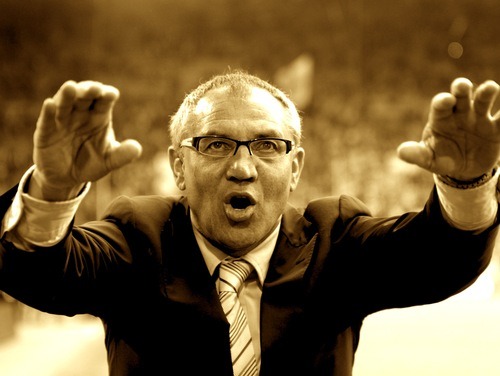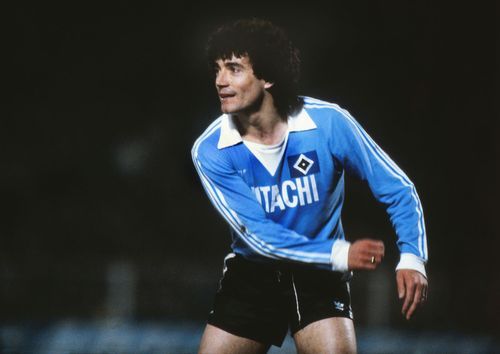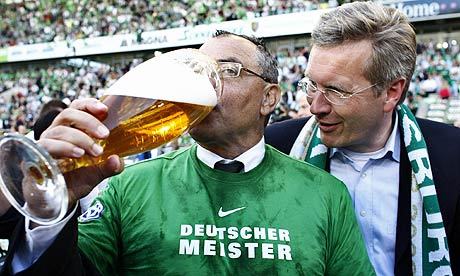Felix Magath will strike back!
Felix Magath will strike back!


By Ross Dunbar
Felix Magath’s relationship with VfL Wolfsburg may have recently ended abruptly, but he still threatens to reach the summit of German football once again. He is far from everyone’s cup of tea.
On his CV, there are two Bundesliga triumphs for FC Bayern, a place in the Champions League for VfB Stuttgart and the incredible 2009 championship victory for Wolfsburg. Perception and reality is two completely opposite things; and in Germany, “the dictator’s” reputation is far from glowing at the moment.
But interestingly, Magath has never been this type of character. Indeed, his time as a footballer has almost certainly shaped his managerial credibility as we know it.
His early footballing career began in Aschaffenburg, before moving to Saarland with 1.FC Saarbrücken where he made 75 appearances, who curiously were one of the founding members of the Bundesliga in 1963. His big break came in 1976 when Kuno Klötzer came calling from Hamburg SV, to create a bond that would last a decade and more than 300 Bundesliga matches.
The timing could have been far from better for the midfielder, joining die Rothosen as their ‘glory years’ began to commence in the 1970s. Prior to Magath’s arrival, Klötzer had already won the DFB Pokal, as well as being runner-up. In the league, Hamburg finished fourth in 1975 and second in 1976, behind a great Borussia Mönchengladbach side.
In his first season at the Volksparkstadion, Magath collected a European honour in the now-defunct UEFA European Cup Winners Cup of 1977, beating RSC Anderlecht 2-0. The player, who was reaching a crucial stage in his career at 23 years of age, netted the second goal with two minutes remaining to end Klötzer’s era at Hamburg on a high note.
Rudi Gutendorf took the reins in July 1977, but only lasted 118 days at the helm of the club with a 50% win ratio. Özcan Arkoç, who was Klötzer’s assistant at HSV in 1976-77, took charge for a further 245 days, registering a 36% win record. In what had been a turbulent campaign, Hamburg finished 10th with Magath missing just one league match in the season.
The deficiencies of that campaign were strengthened by the impact of Serbian coach Branko Zebec who took over in July 1978 and remained in the dugout for a further two years. Magath was in-and-out of the team due to injuries, making just 21 appearances, as Hamburg went on to secure their first ever Bundesliga championship in 1979.

One of the major problems for Arkoç and Gutendorf was the integration of the English international Kevin Keegan into the system, which already accommodated the prolific Horst Hrubesch. Magath bounced back in Zebec’s last season at the club, missing just two games, and becoming an influential performer in the heart of the midfield.
It was no surprise that Zebec’s authoritarian ideology of running the club, as well as, his demanding and sometimes bizarre training methods led to the balance being struck in the Hamburg side. Keegan flourished; and Hamburg went all the way to the European Cup Final of 1980, losing to Nottingham Forest managed by Brian Clough. One particular story of Zebec is that he once introduced a pipe band into training, which dominated the middle of the pitch, for Hamburg to try and exploit wide areas. Genius, or insanity?
The demise of Zebec as a coach, from FC Bayern hero, to bundling alcoholic, is a sad one. The Serbian died in his mid-50s due to alcohol addiction and was rarely caught out when in the public spotlight. On one occasion, Zebec missed the team coach heading back from a Dortmund away match and was stripped of his driving licence after getting behind the wheel under the influence of his favoured ‘whisky and cognac’. His alcohol problems led to Hamburg’s termination of is contract and as die Zeit almost poignetly remember, in this article from 1980 – how he arrived drunk at a press conference, only for his wife to look after him in his drunken state.
The assistant of Zebec, Aleksandar Ristic, completed the campaign as caretaker coach, helping Hamburg to second to place in the Bundesliga. HSV’s General Manager, Gunter Netzer, pulled a rabbit out of the hat, appointing the legendary Ernst Happel as the club’s coach in 1981. The scale of success under Happel took Hamburg to pinnicle of European Football: winning two Bundesliga ‘meisterschafts’, runner-up of the UEFA Cup and the European Cup winners between 1981 and 1983.
Magath’s form excelled under Happel in an attacking-midfield position, as Keegan had departed the club. He scored 10 goals in 32 league games and made 11 international appearances in the 1981 calendar year. The Hamburg star was known for his energetic play, his crafty footwork and a superb left-foot, which eventually cemented his name in Hamburg folklore in May 1983.
“Fantastico Gol Magath” screamed the Italian commentator.
Hamburg were European champions, defeating Juventus 1-0 with Magath lifting the ball expertly over Italian goalkeeper Dino Zoff. To this day, it still remains the greatest night in the history of Hamburger SV.
His domestic form took him to two FIFA World Cup’s for West Germany, but his career ended in an unfortunate damp squib under Happel, picking up a number of serious injuries which forced him to retire in 1987.
Perhaps, Magath’s time working under Zebec and Happel influenced his coaching style a number of decades on. After all, the famous Austrian coach described him as being “too sensitive” when he took over at the tail-end of Magath’s playing career. Happel described him as “a monastery student, too soft for this business".
Former FC Bayern goalkeeper, Oliver Kahn, explained in his weekly BILD column of the problems Magath faced as a coach with such, he said: “To find the right amount of distance and closeness to develop sensitivity to the players needs to be consistent and also to crack down hard times - these are fundamental characteristics of a trainer.
“Magath has not failed because he is a “tough guy”, but because it fails to create a climate of confidence in the long term.”

In his last role at VfL Wolfsburg, Magath had an infamous spat with Brazilian playmaker Diego, who ended up flourishing last season on loan at Atletico Madrid. Interestingly, the two insisted they were on the same wavelength at the beginning of the campaign, but the ineffective performances of the Brazilian on the park were the telling symbol of their relationship.
His intense physical demands has become an almost comical feature in German football over the last few years, which is largely down to the lack of success they have produced for Magath with FC Schalke 04 and in his second spell with Wolfsburg. For example, the use of the hated medicine-ball, or when he emptied water bottles on a hellish run during pre-season – to introduce the concept of “sharing”, has not endeared him to many.
But as Kahn points out, Magath has shown his effectiveness to get the job done, in a similar fashion to the legendary influences of Zebec and Happel. His track record of short-term results and impact on under-performing squads means that it will only be a matter of time before Magath is back in the Bundesliga.
This article is by our German football expert Ross Dunbar, who you can follow on Twitter at @rossdunbar93. Comments below please.







